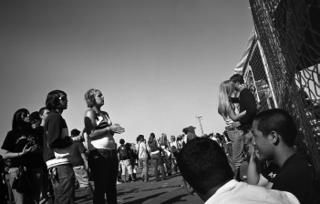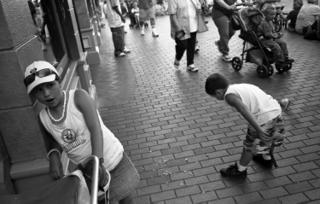I was thinking about the shooting process the other day. I had my camera in hand, and found myself suddenly becoming a spectator to an event. I realized what had happened after the event had transpired. The event was a very brief, but I felt I should have been shooting it, rather than watching it. Afterwards, I began to think about the thin line between being a photographer and a spectator, and imagined that we (hobbyist/photographers) probably all suffer the same affliction from time-to-time: becoming a spectator when we should be photographers.

Here is what might be our typical scenario: we head out of our abode with camera in hand intent on being a photographer, for whatever predetermined length of time. We're on our way; we’re going to go capture some great images. We’re looking and looking, and we shoot what we think might be a great image. Often, we will have composed that image with some determination, intent on imposing some meaning, or sentiment on the shot.We may or may not be successful (we won’t know till later), but we’re feeling pretty good about it. So we walk away from the experience content, maybe looking for a place to eat.
Unknowingly, we’ve slipped out of “photographer mode." Then something on the street happens that attracts our attention. We’ll watch it the way we might watch the participants of a fender-bender accident, casually, noting what they’re doing, checking out the type of people they are, etc. This incident could be anything. It could be something that piques our individual interest, or grabs our attention for reasons entirely unique to us as individuals. We watch the event transpire, without ever thinking to pull the camera up and shoot; in truth, it seemes to me that these are exactly the times that we need to be shooting, to make the images that are unique to us as photographers.
We all have memories of events transpiring in front of us, before we have had the time to shake out of spectator mode and get into photographer mode. The reason for that is we let the spectator mode overtake us. It's very easy to do, because it's just us being us, slipping back into daily life. So, How do we become aware of those incidents? How do we anticipate their occurrence? I don't know, other than shoot a lot of pictures, always have a camera in your hands, relaxing, and always be a photographer.

I’ve read interviews with noted street photographers who, when asked about how or why a particular image was made, responded that the reason they chose to photograph a scene came down to their eye being caught by something mundane, like an article of clothing, a shadow, etc. Rather than being a spectator they were a photographer and did what photographers do: they pressed the shutter.
I imagine the secret is to tune yourself to strattle the spectator/photographer line, and key into those spectator instincts, allow yourself to casually be apart of everything and pick up on the things that interest you and then when triggered going immediately for the camera.

It seems like an incredibly fine line, and working around it seems to be more a required technique for street photographers. Many wonderful photographs have been made while giving precious little thought to keying into instincts (see landscape and still photography). A lot of us are content with reserving some time for photography and going out and shooting what we want, when we want, and how we want. I've been looking at the work of some really great photographers lately, and I've been wondering how these photographers can continually, consistently come up with such great images. All of their images are so original, unique, spontaneous and fresh, despite being decades old. I imagined that they had to have to been "on" all the time, and so in tune to their surroundings, instinctual. They must be (or must have been) able to key into those unique things that caught their eye. They must have been able to straddle the line between spectator and photographer.
I’m reminded of the film, Pecker. About three-quarters of the way through the film, Pecker is in the gay bar where his sister works. He witnesses her get sacked, because of events stemming from Pecker’s new found fame. His sister is in tears sobbing and yelling behind the bar about being fired, while all the patrons look on (spectators). In the silence of her soliloquy, the flash from a picture taken by Pecker suddenly hits her. We cut to Pecker with a sheepishly apologetic face. Way to go Pecker!